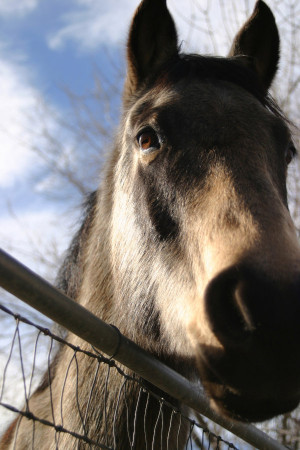How would a national identification registry help improve horse welfare?
Currently, horse owners are not required to identify or register their horses and there is no national database to record and retrieve this information. The establishment of a national horse registry would substantially improve traceability of horses across Australia, thereby achieving more effective responses to situations involving horses, including neglect and cruelty reports, as well as serious disease outbreaks and emergency situations such as fire and floods.

Why is a national registry needed?
Compared to other livestock and companion animals, horses are generally unregulated in terms of their identification, management and movement. However, the keeping of horses for sport and recreation is a popular interest with over 600,000 horses estimated in Victoria alone.
In the event of an emergency, including where horses are neglected, it is essential to be able to contact the owner quickly to arrange removal and/or appropriate treatment or veterinary care. The RSPCA receives many cruelty reports involving thousands of horses every year across Australia, usually due to lack of feed, water or shelter, which require rapid action to be taken. The important work undertaken by RSPCA inspectors to alleviate and prevent further suffering of ill-treated or neglected horses is severely hindered if the owner cannot be contacted.
Furthermore, if horses are located after being stolen or having fled a natural disaster, reuniting them with their owner will be quicker and easier if they are identified and recorded on a national registry.
In relation to horse racing, the community expects the industry to make appropriate provisions for horses upon retirement instead of sending ‘spent’ horses to the knackery or abattoir. A comprehensive national register available to authorised people would help provide community assurance that information is available to review the fate of horses after they leave the industry.
How would a national registry work?
The RSPCA believes that microchipping is the vital first step in this process to ensure individual horse identification. Some owners already microchip their horses, with a number of breed and equestrian organisations requiring horses to be microchipped. A microchip is a permanent method of electronic identification. The chip itself is very small – about the size of a grain of rice – and is implanted just under the skin on the left hand side along the neck underneath the mane. Each chip has a unique number that is detected using a microchip scanner.
The second important step is comprehensive registration of horses which allows government and enforcement agencies to determine the numbers, location and ownership of horses across the country. The registry should allow users to check that data is correct, to report horses as missing, change status or alerts and check if a horse is legally for sale.
The United Kingdom has recently developed an equine register which may provide a good framework for the development of a similar registry in Australia. For more information, see the Equine Register website and The Equine Identification (England) Regulations 2018.
Was this article helpful?
This work is licensed under a Creative Commons Attribution-NonCommercial-NoDerivatives 4.0 International License.


